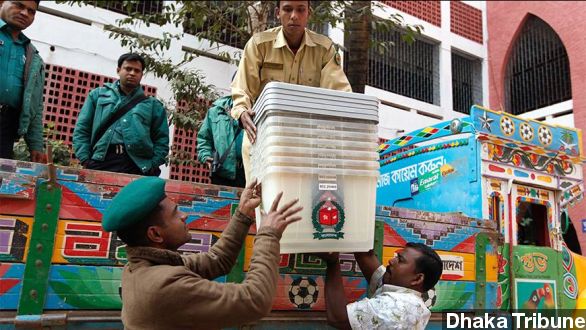Bangladesh held its general election Sunday, and the country's ruling party claimed a near-inevitable victory. But the results were overshadowed by low voter turnout, opposition boycotts and a wave of violent protests that killed at least 18 people.
Demonstrators from various opposition parties torched voting stations and clashed with riot police to protest the elections. At least 183 polling places were forced to suspend their activities amid security concerns. (Via Deutsche Welle)
It's the latest clash in a series of conflicts plaguing Bangladesh. Opposition activists have orchestrated mass strikes, attacks and transportation blockades over the past few months, killing dozens and crippling the country's economy. (Via BBC)
Bangladesh's election day should have pitted the country's current ruling party, the Awami League, against its chief rivals, the Bangladesh Nationalist Party, or B.N.P, along with several smaller opposition parties. (Via Al Jazeera)
If that were the case, the election would have been a showdown between Bangladesh's current Awami League leader, Sheikh Hasina, and its former B.N.P. Prime Minister Khaleda Zia. The two women have been trading the prime minister's seat back and forth since 1991. (Via The White House / Lawrence Jackson, Agencia Brasil / Antonio Milena)
But the electoral showdown collapsed into a much more ominous confrontation after Hasina's government refused to allow a neutral third party to administer the elections.
The move prompted the B.N.P. and most other major opposition parties to boycott the elections. The Awami League wound up running unopposed for 153 parliamentary seats, and Hasina herself had no significant challengers. (Via Euronews)
All told, less than half the country's population could cast a vote, and several polling places that did host voting reported turnouts below 25 percent. A B.N.P. activist lauded the electoral boycott to The New York Times, saying: "No one is listening to our voice. This is the only way to resist the elections."
Bangladesh has seen election boycotts once before in recent memory. And back then, the shoe was on the other foot.
In 1996 the Awami League boycotted the national elections, claiming Zia's B.N.P. had rigged the polls. Although the B.N.P. claimed a landslide victory then, the political uproar forced Zia to call a special election months later, which the Awami League won. (Via CNN, Democracy International)
Now it's the Awami League being pressured to hold another election. But a writer for The Daily Star says Bangladesh cannot afford to keep repeating its history again and again.
"Unless this vicious cycle of acrimony and confrontation ends and we move to a democracy that is stable, matured, and functional, the outcome is continued slide to political bankruptcy and economic collapse. We are not a failed state but as a state we are failing on things that matter most."
The government is expected to announce the election results Monday.


